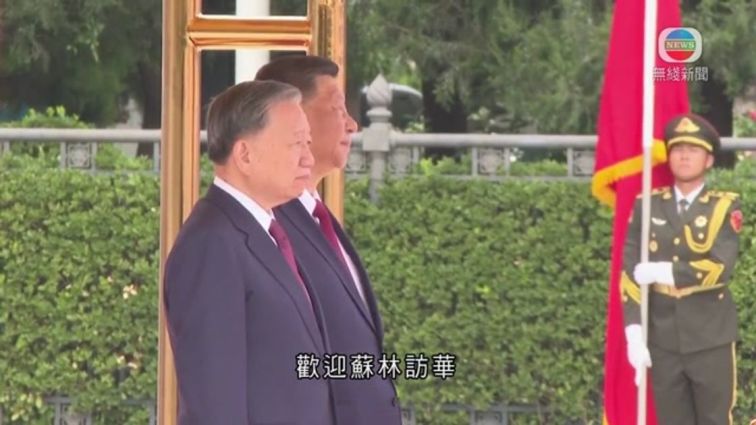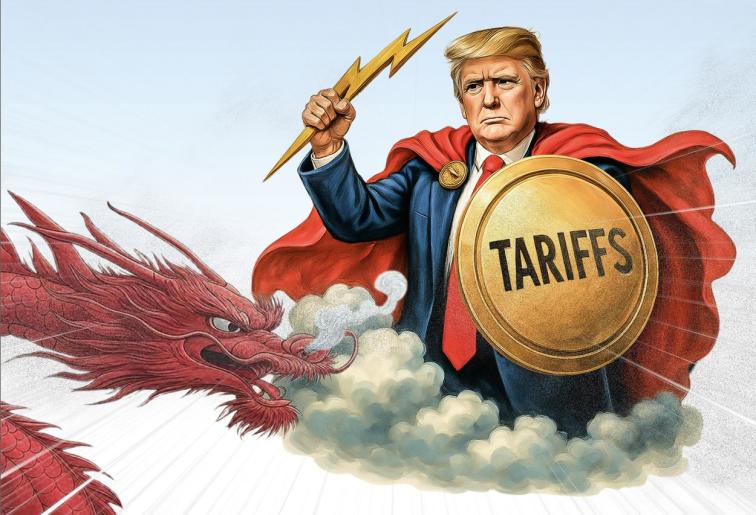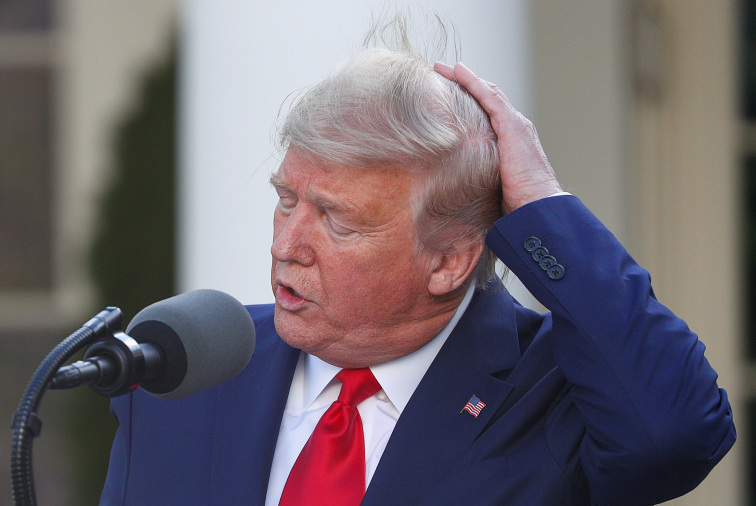On the evening of December 12, Xi Jinping stood up, bent slightly, and raised his wine glass to toast Nguyen Phu Trong, General Secretary of the Communist Party of Vietnam. (Video screenshot)
[People News] In an effort to generate support for Xi Jinping's visit to three Southeast Asian countries, the Communist Party of China convened a Central Peripheral Work Conference from April 8 to 9. The aim was to unify the "friendly, sincere, beneficial, and inclusive" approach to peripheral diplomacy in response to the U.S. trade tariff war. On the 14th, Xi Jinping arrived in Hanoi, Vietnam, bringing with him a substantial amount of RMB that reflects the Communist Party's unified stance. The Chinese Ministry of Foreign Affairs stated that China and Vietnam are socialist friendly neighbours, and this visit is intended to enhance strategic mutual trust and deepen practical cooperation... Xi Jinping highlighted the need for stronger collaboration with Vietnam in trade and supply chains.
On the evening of the 14th, state media reported that Xi Jinping and Nguyen Phu Trong (Nguyễn Phú Trọng), the General Secretary of the Communist Party of Vietnam, jointly witnessed the signing of 45 bilateral cooperation agreements. These agreements cover various fields, including connectivity, artificial intelligence, customs inspection and quarantine, agricultural product trade, culture and sports, people's livelihoods, human resource development, and media.
How much RMB will be needed for these 45 bilateral cooperation projects? Only the Communist Party knows. How many genuine gestures of goodwill can be expected from the southern countries? Only the Communist Party knows. Nevertheless, foreign media analyses suggest that the relationship between the Communist Party and local countries is quite complex, as these nations must navigate the challenge of balancing their diplomacy with the United States while also preventing an influx of cheap goods from mainland China from adversely affecting their local economies.
In a recent media interview, Associate Professor Zhuang Jiaying from the Department of Political Science at the National University of Singapore remarked that Xi Jinping's visit to Southeast Asia is strategically timed to capitalise on the current tensions between regional countries and the United States over tariff issues. He aims to proactively strengthen ties with these nations. However, due to existing conflicts with these countries, they are unlikely to 'choose sides' and align themselves with Beijing.
Historically, Southeast Asian countries have acted as transfer points for Chinese goods destined for export. Now, with Trump imposing tariffs on both the Chinese Communist Party and the primary foreign trade partners in this region, the Southeast Asian market is struggling to cope with the pressure. Reports from foreign media indicate that, under U.S. pressure, Vietnam is tightening its control over Chinese products to ensure that items labelled 'Made in Vietnam' possess sufficient added value. In an effort to win over Vietnam, the Chinese Communist Party may offer concessions in the ongoing South China Sea disputes, in addition to providing financial assistance.
According to the Ministry of National Defence of the Chinese Communist Party, from April 11 to 17, friendly exchanges on border defence between China and Vietnam will take place in Guangxi and relevant areas and ports in Vietnam's Lang Son Province. Additionally, from April 16 to 17, naval fleets from both the Chinese Communist Party and Vietnam will conduct joint patrols in the Gulf of Tonkin to further enhance practical cooperation between their militaries.
Vietnam has indeed shown great respect for the party leader, with youth performing dances to welcome him and nearly all senior officials participating in discussions. In Hanoi, extensive security measures were implemented to ensure there were no blind spots; it was nearly impossible for Chinese nationals wishing to voice complaints or express demands to even catch a distant glimpse of the proceedings. The party leader seemed to regard them as a significant threat.
Local media reports indicate that on April 15, the party leader arrived in Malaysia. Authorities announced on the 14th that police had blocked and controlled 136 roads and locations in the Klang Valley. This included specific sections between Kuala Lumpur International Airport Terminal 1 and the Hilton Garden Inn Putrajaya, as well as the routes connecting the hotel to the National Palace and the Prime Minister's residence in Putrajaya. The police implemented phased road closures on 17 roads in Kuala Lumpur and deployed approximately 378 officers for this operation. Chinese Communist Party agents were extensively deployed throughout Kuala Lumpur. Local Chinese residents reported that helicopters were circling over the city on the 15th, and the sound of police sirens was pervasive on the streets. Media reports also suggested that Xi Jinping arrived with his own bulletproof vehicle for this visit.
It seems that only the leader of the Chinese Communist Party, who boasts of 'confidence in the road and system,' would necessitate such extensive security measures when visiting another country. Xi Jinping is set to visit Hungary from May 5 to 10, 2024, and has requested that Chinese police be permitted to patrol in the country. According to the local investigative portal VSquare, strict security protocols have nearly brought the capital city of Budapest to a standstill.
Taiwanese media outlet 'Shang Bao' reported that ahead of the BRICS summit in August 2023, South African police confirmed that Xi Jinping brought a delegation of up to 500 people for his visit. During the summit, he booked two hotels, and a month earlier, authorities had arranged for a complete set of furniture to be shipped from China, including cups, bowls, beds, mattresses, carpets, and even curtains, leaving no South African items in the rooms. 'He (Xi Jinping) completely reconstructed a new presidential suite.'
In November 2018, Xi Jinping visited Papua New Guinea, where two domestically manufactured bulletproof vehicles were airlifted from China. In December of the same year, during a two-day visit to Portugal, Xi Jinping spent two million euros to book all the rooms at the Ritz Hotel and had the hotel garage door widened to accommodate the bulletproof vehicles he brought with him. It appears that there were assassination threats against him everywhere.
When the party leader observes foreign nations bowing and showing deference to him, it undoubtedly brings him satisfaction. After enjoying a cup of hot wine, he casually dispenses '200 jin' of 'people's currency'. However, the host country, in its efforts to appease a foreign leader, may harbour a sense of contempt for the profit-driven Chinese Communist Party, as it sacrifices its own dignity and the rights of its citizens. Nevertheless, after this lavish display of spending, upon returning to Beijing, he faces a domestic economy on the verge of collapse, a crisis in people's livelihoods, and a political regime under threat, making it likely that the party leader struggles to cope with the '200 jin' of pressure.








News magazine bootstrap themes!
I like this themes, fast loading and look profesional
Thank you Carlos!
You're welcome!
Please support me with give positive rating!
Yes Sure!